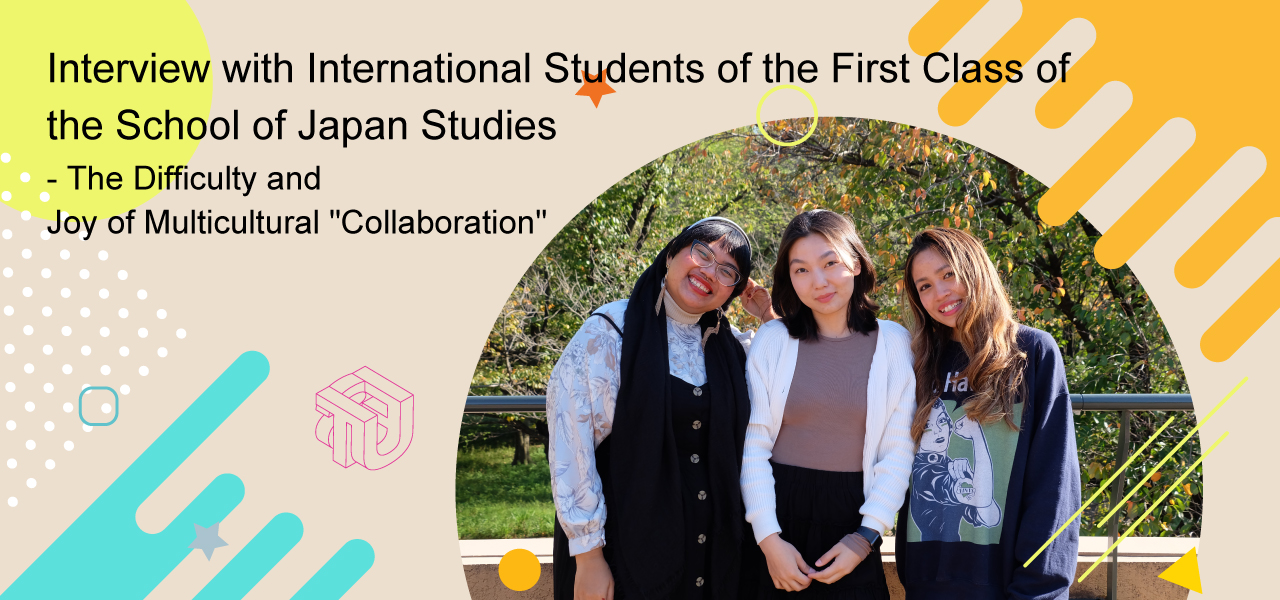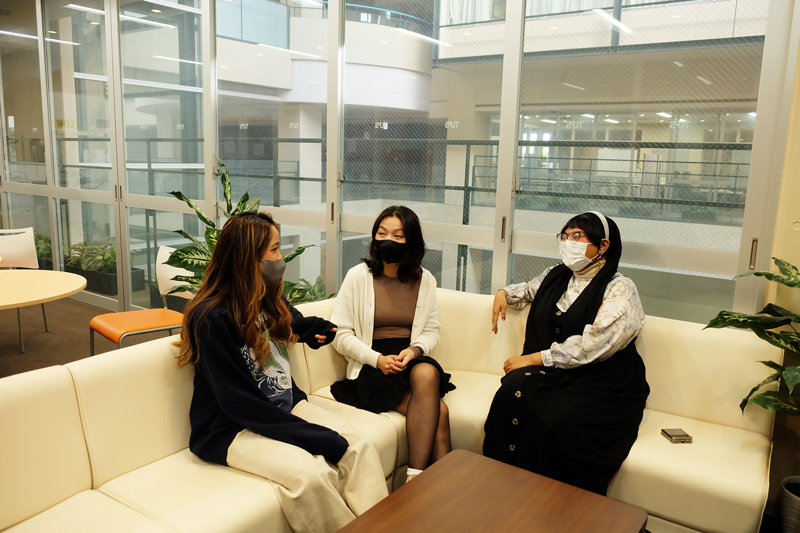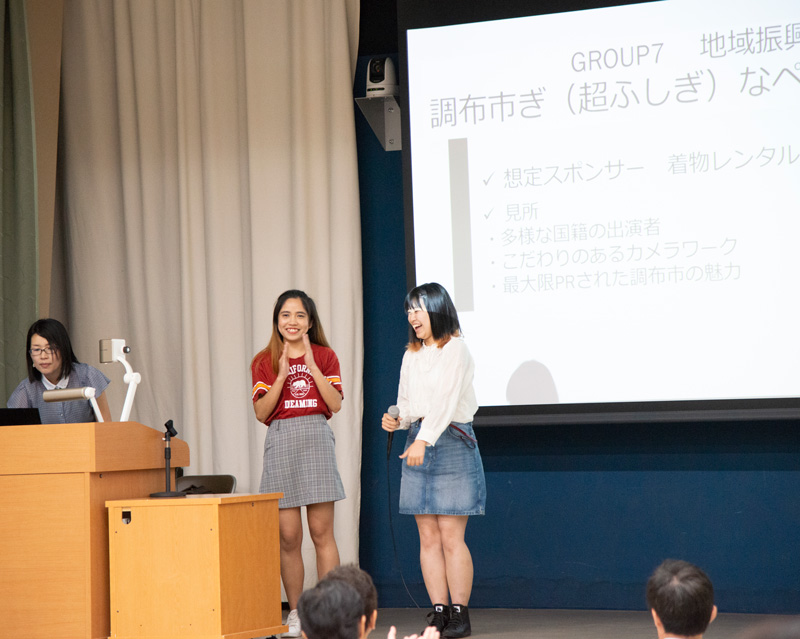Interview with International Students of the First Class of the School of Japan Studies – The Difficulty and Joy of Multicultural “Collaboration”
外大生インタビュー

The School of Japan Studies (SJS), newly established in AY 2019, is one of the most international faculties at Tokyo University of Foreign Studies (TUFS), where international and Japanese students study together in the same classroom. The goal of SJS is to redefine “Japan in the world” with English and Japanese as common languages. For this issue, we held a roundtable discussion with three international students in their fourth year of SJS, who entered the SJS as first class and are scheduled to graduate this March, to hear their reasons for deciding to enroll and what they have learned over the past four years.
- Chawanrat Oe Valpanit (Fourth year, SJS, from Thailand) (“Oe”)
- Aibyek Ainur (Fourh year, SJS, from Mongolia) (“Ainur”)
- Nur’Aisha Binte Johari Mohd Zain (Fourth year, SJS, from Singapore) (“Aisha”)
Interviewer and article writer: Ms. Yui Hasebe (Third year, School of International and Area Studies)
From Encountering Japan to Studying in Japan

—- First, please tell us how you became interested in the Japanese language and culture and why you decided to study at SJS.
Oe: After graduating from high school, I wanted to learn about foreign languages and cultures. At that time, I found out about the SJS at TUFS and decided to give it a try. Actually, I also applied to universities in the U.S. and Australia. And in my case, I did not limit myself to Japan from the beginning. I found the prospect of learning a new language and culture attractive and eventually decided to go to TUFS.
Ainur: I was educated in English in high school, so I initially thought about studying abroad in an English-speaking country. I was attracted to the curriculum of the SJS at TUFS, and then I learned about the Japanese Government Scholarship (MEXT) Program, and decided to apply for it. I did not have a clear idea of which field of study I wanted to pursue upon graduation from high school. In the SJS, students first explore their interests by taking a wide range of liberal arts classes, such as politics, literature, linguistics, and international relations, before choosing a specialization in their third year. I thought this style was perfect for me. Actually, since my father and aunt studied in Japan, I have been traveling to Japan and receiving Japanese souvenirs from my family since I was a child, so Japan was very familiar to me.
Aisha: The Japanese Government Scholarship was also a major deciding factor for me. I remember watching Japanese anime on TV from a very young age and found the sound of the Japanese language very appealing. Later, through anime, I became even more interested in Japanese culture.
Starting life in Japan, support
—-Oe and Ainur did not necessarily have a strong interest in Japan. I think it was very courageous of you.
Aisha: It was a challenge at the beginning. In my case, I had studied Japanese for about a year before coming to Japan, but that was not enough to live in Japan as I only took classes once a week. I knew that the program was bilingual in English and Japanese, so I understood that I needed to be able to speak Japanese to some extent by the time I graduated. So I was willing to embark no matter how difficult it was. Even now, of course, there are still many difficulties. But looking back, it was very hard, especially in the first year. I am proud that I was able to overcome them.
—-How did you overcome those difficulties?
Aisha: We overcame them by supporting each other as international students.
Oe: I think it depends on how much effort you are willing to put in. For example, trying to output the Japanese you learned in class when talking with your friends, or trying to make Japanese friends. I think these things depend on your own motivation. Also, the support of Ms. Rie Ishida, the international student advisor, helped me a lot. She always helped me with my daily homework, paperwork from the city hall, about vaccinations, when I needed to go to the hospital, and so on.
Ainur: Ms. Ishida was also very supportive mentally. She listened to me and gave me advice during hard times.
Struggling to learn Japanese
—-Please tell us about your study during first and second years.
Oe: At the beginning of enrollment, we study Japanese intensively. Before I came to Japan, I did not know a single Japanese word, so I started learning Japanese from scratch after entering the school. During my first semester, I took two Japanese classes every day and also did self-study outside of class, so that by the end of the first semester, I had acquired the basic Japanese necessary for living in Japan. I think that having Japanese classes as part of the university curriculum helped me get used to life in Japan, and even in my fourth year, although it is not mandatory, I can still take Japanese classes as electives so that I can further improve my Japanese language skills depending on the level I want to achieve.
Ainur: It was already expected that we would be taking a variety of classes in Japanese in my third year, so I struggled to study Japanese for the first two years to prepare for this. What I really appreciated at that time was the support and understanding of the professors and teachers towards us. For example, some classes were taught in Japanese but allowed us to do our report assignments in English. In that way, many of the classes were bilingual.
Aisha: I had to take a lot of classes during my first two years, which was a challenge, but I enjoyed sharing the difficulties with my classmates. Many of the classes had group activities and presentations, so I always learned while collaborating with my peers.
Oe: We also had opportunities to collaborate with the entire SJS at the GAIGOSAI Festival’s food stall and foreign language play, and I think I was able to make many Japanese friends there.

Experiencing the difficulty and joy in multicultural “collaboration”.
—-What was your most memorable class in your first year?
Ainur: In the Multicultural Collaboration class that I took in the spring semester of my first year, we did a project to make a video about the charms of our community. Working in groups made up of members from different backgrounds, we decided on the theme, conducted research and interviews, and filmed and edited the video. Since this class started in the first semester of enrollment, many of the international students’ Japanese was not yet at a sufficient level, so they received help from Japanese students in various situations. I think that is where Multicultural Collaboration began. The international and Japanese students learned to work together, translating and helping each other in Japanese and English.
Aisha: Although not limited to this class, “Multicultural Collaboration” is both difficult and fun. Working together as a group to accomplish something is itself a challenge. So in our case, it had an added layer to it. Through actually working together in diversity, I think we were able to learn how to collaborate, overcoming language barriers, cultural barriers, and differences in how we discuss things.
Oe: Through this Multicultural Collaboration class, I learned that there are diverse cultural differences in the way we work and discuss things. For example, there was a difference of opinion on whether we should take a majority vote when deciding something as a group, or whether we should create a leader and have him or her decide to some extent. Through these experiences, we learned what it takes to work together in a multicultural group.
Aisha: Ainur and I were in the same group, and we were the only international students in our group. Besides, none of the Japanese students in our group had studied abroad, so it was the first time for us to work in a multicultural group. At that time, we had just started studying Japanese and could not speak it well. So at first, due to the language barrier, there was a gap between us international students and Japanese students, and it was difficult to cooperate with each other. For example, at the stage of discussing and making decisions or coming up with ideas, it was very difficult even though all the members were very motivated.
Ainur: Yes, that’s right. Looking back, I remember that we had the most difficulty in decision making. We came up with a lot of ideas, but I think it was difficult to narrow it down to any one thing, partly because the members were a bit shy. However, one of the Japanese members, who was confident in his English, actively acted as a bridge between us, translating and so on. Now that I think about it, most of the difficulties seemed to be language issues.


Comprehensive study of Japan and my own specialized research
—- Next, please tell us about your studies in your third and fourth years and your research in the Research Seminar.
Oe: In my third year, I took many classes related to film. I also took social science classes on politics, economics, Japanese culture, and Japanese society. Then, in my fourth year, I decided to study Japanese film in Professor Iris Haukamp’s Research Seminar. For my graduation thesis, I wrote about the impact of Corona on Japanese anime streaming services. I was interested in how the Corona pandemic is further developing streaming services and how this affects the anime industry in Japan and abroad, and my research crossed the fields of economics, Japanese society, and film.
Ainur: I am a member of Professor Masami Kimura’s International Relations and Diplomatic History Reseaerch Seminar, and after my second year, I took classes on Japanese politics taught by Prof. Nobuo Haruna and international relations and diplomacy taught by Prof. Masami Kimura. I am particularly interested in modern diplomacy. Unlike conventional diplomacy, which involves traveling back and forth between remote areas, I believe that a new style of diplomacy is emerging now that we are able to connect using the Internet. Developing from this idea, for my graduation thesis I researched the topic of “digital diplomacy” and how the Internet and social networking sites affect modern international relations.
Aisha: In my second and third years, I took classes with Professors Nobuo Haruna, Tsutomu Tomotsune, and John Porter, where I studied politics and history with a focus on philosophy and intellectual history. I had always wanted to deepen my understanding of contemporary society through history. For this reason, I decided to join Professor John Porter’s Research Seminar. For my graduation thesis, I am researching migrant workers in Singapore. My research was mainly from a sociological perspective, but I also crossed on historical perspectives, especially on class differences. My research seeks to understand class from a contemporary perspective, focusing on the underclass of the global fracture.
The experience of learning and collaborating with students from all over the world
—- I believe that the SJS is unique in that Japanese and international students study together. What did you learn from this experience?
Oe: Through studying and collaborating in the same classroom with students from various countries and regions, I was able to learn deeply not only about cultural differences but also about my own culture. On top of that, I learned how to find the “middle ground” to work together in each culture and how to communicate effectively with each other. I think these soft skills and how to communicate in different languages will be useful even after I enter the workforce.
Aisha: One thing I learned from my experience working with Japanese students is the importance of reading between the lines and understanding a person’s true intentions. I would like to take this skill to my grave (laughs). In Japanese culture, generally speaking, there is a lack of explicit answers. This is especially true when someone doesn’t like the ideas I put forward or when someone doesn’t agree with them. In my culture, if I don’t agree with someone, I can clearly say, “I don’t agree. But I have not heard my Japanese friends say that to me. That does not mean that they always agree with me. In the beginning, I wasn’t used to it at all, so I thought, “If you don’t like it, just say so!” (laughs). But now I have come to understand that this way of communicating is part of Japanese culture. I have started to observe my Japanese friends’ words and body language more carefully and try to understand the hidden meaning behind their words.
—- Indeed, when I disagree with someone’s opinion during a discussion, I tend to say something like, “But, but…isn’t that…?” instead of denying it. I find that discovery very interesting.
Oe: I think one of the most attractive features of the SJS is its diversity. I think I am where I am today because I had the experience of learning and cooperating with students from all over the world, including Asia, Europe, North America, and so on. Looking back, I don’t think I was at all culturally sensitive when I entered the school. For example, I would ask something or bring up a certain topic without realizing that it might offend someone from a certain culture. Now, as Aisha said, I am more observant of my surroundings. I think this is very important when talking to people from different cultures and countries.
Aisha: Yes, it is. For example, when I first enrolled, I had some trouble with my Japanese classmates talking about food and asking why there were so many things we could not eat in the cafeteria. However, after a while, everyone became more considerate when eating together or talking about meals.
Ainur: I think we have learned not only about the “Japanese” language, but also about different cultures.
After TUFS?
—- How do you hope to apply what you learned at TUFS in the future?
Ainur: I would like to go on to graduate school and further study international relations. While studying at TUFS, I have come to think that I would like to work for an international company or institution.
Aisha: I will also go on to graduate school, but after that I would like to be involved in “teaching”. I think my experience in Japan was the most valuable time of my life. No matter what I decide to do in the future, I will cherish what I have learned during these four years. I believe that the four years I spent here were a time that cannot be replicated anywhere else. I can say this with pride. What I have learned with and from the students around me, I hope to apply to my graduate studies and to my future teaching position.
Oe: At this point, I am thinking of going on to graduate school, and having spent four years in Japan, I have gained the kind of confidence that says, “I can go anywhere now.”
Message to those interested in the School of Japan Studies
—- Finally, do you have any message for those who are interested in the SJS?
Oe: I think TUFS has a strong image of studying abroad, but in the SJS, the classes themselves are like studying abroad. Not only do students learn about Japan, but they also learn about “Japan in the world” and Japan in relation to the rest of the world. I think it is the best environment for those who are interested in that field.
Ainur: I recommend the SJS to those who have not yet defined their interests or the field they want to pursue upon graduation from high school. Studying at the SJS gave me the opportunity to be exposed to a variety of cultures and academic fields. I had not yet found my interests when I entered the school, but TUFS really helped me find myself here.
Aisha: If you want to experience the “ international community ” on campus, I highly recommend you to come here. If I had one piece of advice, it would be to come with an “open mind”. I think you need to be prepared to break down everything you know and get ready to learn again.
After the Interview
This semester, I took a class on multicultural communication and learned that there are top-down and majority decision-making methods and that some cultures, including Japanese, emphasize avoiding confrontation.After hearing their stories, I realized that they have learned what I learned in class through their own experiences. I look forward to their future endeavors.
Finally, thank you very much for your willingness to cooperate with us for this interview.
Yui Hasebe, third year student of East Asian Region, School of International and Area Studies


